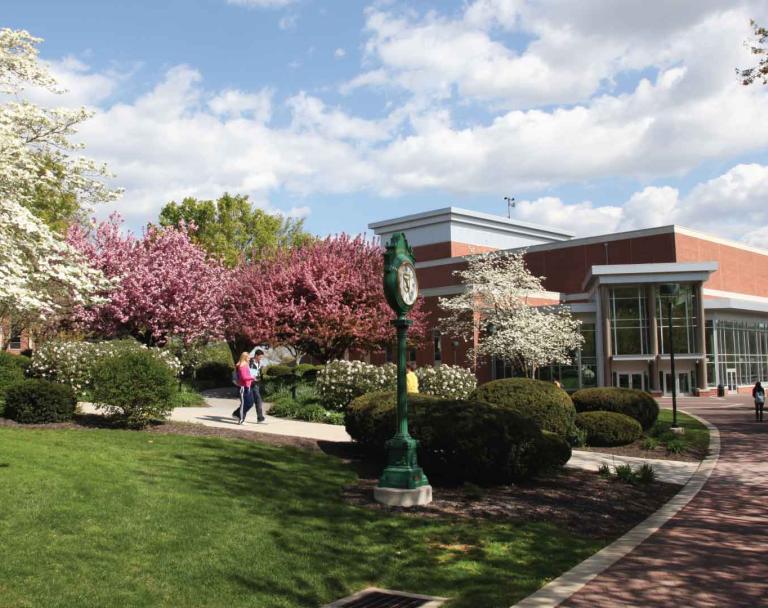Sport Behavior

- Academics
- Graham School of Business
- Spotlights
- Sport Behavior
Sport Behavior students tag-team learning with Southern Branch YMCA of York and York County
Dr. Molly Hayes says this educational-experiential partnership adds a deeper level of understanding to the Sport Behavior material.Imagine that you’ve never ridden a bicycle. Someone hands you the written directions.
You read them thoroughly and study the process. But, do you really know how to ride a bike?
That experience is much different than climbing on a bike for the first time and feeling the terrified glee of wobbling your way down a grassy hill into a state of gloriously balanced freedom.
Educators call that experiential learning; one of the most effective ways to fully understand something new.
“Our whole curriculum is built on experiential learning,” says Dr. Molly Hayes, a professor at York College. For the second year in a row, Dr. Hayes has applied this idea to her Sport Behavior course.
Sharing knowledge
Traditionally, Sport Behavior students were taught topics like motivational theories, methods of increasing motivation, how to give effective feedback and reinforcement, and how to create environments for the best team dynamic.
But last year, Dr. Hayes decided to present that same course curriculum a different way.
“I started talking with Travis Bowman at the YMCA,” she says.
Bowman is the Youth/Teen Sports and Camp Director with the Southern Branch YMCA of York and York County, a 2014 York College graduate, and one of Dr. Hayes’ former students.
“Instead of just knowing this information and doing applied activities in the classroom, I thought it would be interesting if my students could actually share their knowledge and their ideas.”
She had an idea of her own and asked Bowman if he needed any help.
“I’m always on the lookout for new ways to engage the kids,” he says.
An educational-experiential partnership
“I took Dr. Hayes’ class as a sophomore at York College,” says Bowman. “We did chapter projects in groups and then presented that material to the class.”
Bowman’s role at the Y includes working on skills and drills with kids. Along with various physical activities, he gets his kids involved in everything from flag football and soccer to basketball and lacrosse.
Early in the semester, Dr. Hayes brings her class to the YMCA so that Bowman can offer them a tour, a chance to meet some of the staff, and get a sense of what they do.
“Seeing and meeting someone in the field,” Bowman says, “really helps them understand better how to create activities with our objectives in mind.”
“By meeting Travis,” Dr. Hayes says, “they get this sense that what they’re doing is real, it affects real people in many ways.”
Deeper level of understanding
Dr. Hayes says this educational-experiential partnership with the YMCA adds a deeper level of understanding to the Sport Behavior material.
“We are helping them understand how the Sport Management field looks at knowledge and looks at information,” she says.
From his interaction with last years’ students, Bowman could tell that this dynamic learning process is much different from what he experienced. Evidence-based material, however, remains a must.
“They have to draw from credible research or credible professional resources and support their ideas,” Dr. Hayes explains. “You can be as creative as you like, but if you have no support for it, then it’s just a creative idea.”
The final test
Once Dr. Hayes and her students sorted out the creative ideas from the evidence-based ideas, Bowman and last years’ YMCA Executive Director came for a final presentation.
“The students presented an overview of their activities and the reasoning behind them,” Hayes says.
“It was nice,” says Bowman. “They gave us instructional demos and detailed how each drill would be run. Afterward, the Director and I were able to offer our feedback.”
At the end of the course, Dr. Hayes asks students to complete a class evaluation. Last years’ feedback was very positive.
“They loved the project,” Hayes says. “They felt like they were doing something real, something beneficial.”
Do it again
Dr. Hayes enjoys the community partnership experience — the school’s Sport Marketing class recently worked with the York Revolution with similar success, thanks to work by her colleague Dr. Mike Mudrick.
“I would absolutely do this kind of partnership with the community again,” she says. “The students increase in their skill development and the community organizations have a need met, one that they just didn’t have the time or the resources to handle.”
Bowman can attest to the practical benefits of the project.
“When I’m coaching youth sports,” he explains, “there are times when I’m sitting in my office wondering what new activity I can offer the children."
Thanks to last year’s Sport Behavior class, keeping things fresh is as easy as opening the binder.
“I flip through their folders,” Bowman says, “and implement one of their activities that night. The kids love it.”

